Photo source: collage
From the content of the article
The wheat sprouted by Saint Andrew, celebrated on November 30, is an old tradition full of spiritual and symbolic meanings. This custom is practiced in many regions of Romania and is considered a ritual of luck, abundance and fulfillment.
Who was Saint Andrew and why is he important for Romanians?

Saint Andrew the Apostle was the brother of Saint Peter the Apostle and the son of Jonah, a fisherman from Galilee. Saint Andrew is believed to have witnessed the baptism of Jesus Christ and was called “The First Called”, meaning the first disciple of John the Baptist.
After the Ascension of the Lord, all the apostles went on the Christianization mission and it is said that Saint Andrew reached the lands around the Black Sea, up to the Danube. He took shelter in a cave in today’s Dobrogea.
In 1997, Saint Andrew the Apostle was proclaimed the Patron Saint of Romania, and the day of his celebration became a national church holiday.
Why is wheat put on the sprouting of St. Andrew?
- Symbol of fertility and new life: Sprouted wheat symbolizes the rebirth of nature, beginnings and hope for a fruitful year.
- Sign of prosperity: A beautiful, richly sprouted wheat is believed to bring abundance and good luck to the household for the coming year.
- Ancestral tradition: It is a custom inherited from the agrarian culture, where wheat was essential for survival and prosperity.
What do you do with sprouted wheat?
- Sign of abundance: Keep it in the house until after the New Year to attract good luck.
- Holiday ornament: You can use sprouted wheat for Christmas table or tree decoration.
- Symbolic sowing: After the holidays, wheat can be planted outside or offered to animals as a gesture of thanks to nature.


The information presented in this website is informative and does not replace the medical diagnosis or the product leaflet. Any decision regarding your health should only be made after consulting your doctor.
You can also follow us on Telegram.
Source: www.doctorulzilei.ro



